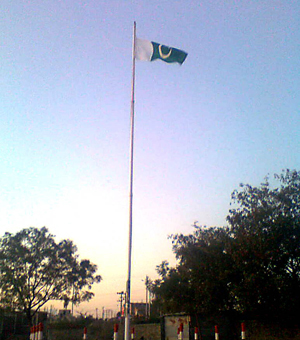Bijapur, January 4: Police have arrested six persons in connection with hoisting of Pakistani flag over the tahsildar's office at Sindagi town in the district.

Superintendent of Police D C Rajappa has confirmed that all the arrested were the members of the student wing of Sri Ram Sene, an extremist organization led by Pramod Mutalik.
The accused have been identified as Rajesh Siddaramaiah Matha (19), Arun Vagmore (20), Parashu Rama Vagmore (20), Sunil Madivalappa Agasar (18), Eshwar Navi (18) and Mallana Gowda Vijaya Kumar Patil. Among them Rajesh Siddaramaiah Matha is the president of the student wing of Sri Rama Sene.
The SP said that the efforts were on to trace one more person.
During enquiry police found that a two-wheeler was parked in front of the tehsildar office on the day of the incident. When they took the owner of the two-wheeler and his friend into custody, they revealed the names of the other students, he said.
The sudden appearance of Pakistani flag at tahsildar's office during New Year celebrations had spurred violence in Sindgi and surroundings. Miscreants had damaged vehicles and pelted stones at shops in the town.
A bundh call was also given by various organisations including Sri Rama Sene and Bajrang Dal to protest against hoisting of Pak flag.
It is alleged that the incident was a conspiracy of Sri Rama Sene, which wanted to create communal riot in the region.

People in Sindgi had shocked to witness Pakistan National Flag seen over Tahasildaar office on January 1






Comments
remove the underwear and all cloth of this idiot along with his leader and throw him to pakistan border. this is the only punishment for these people. where are these VHP patriots.
Add new comment